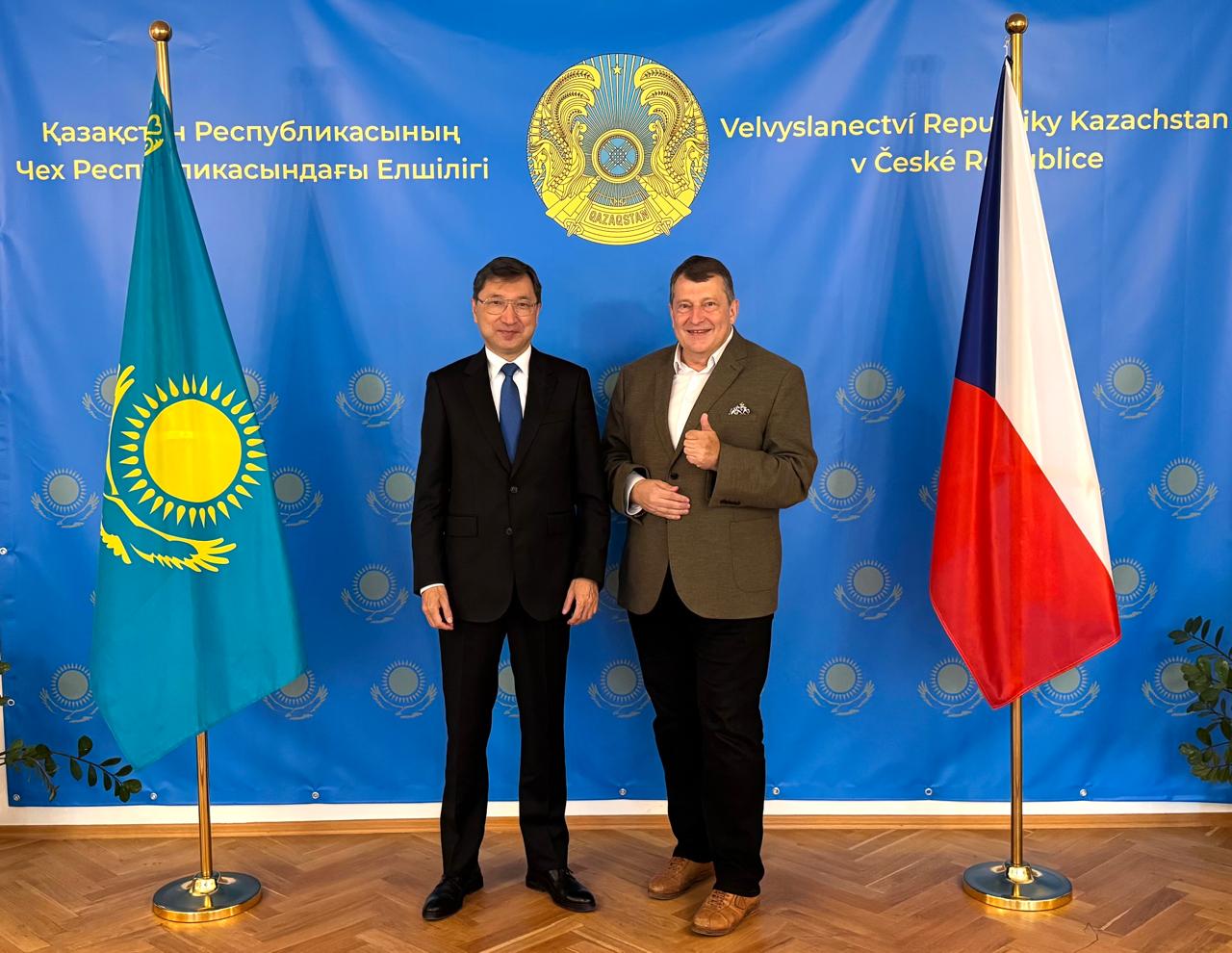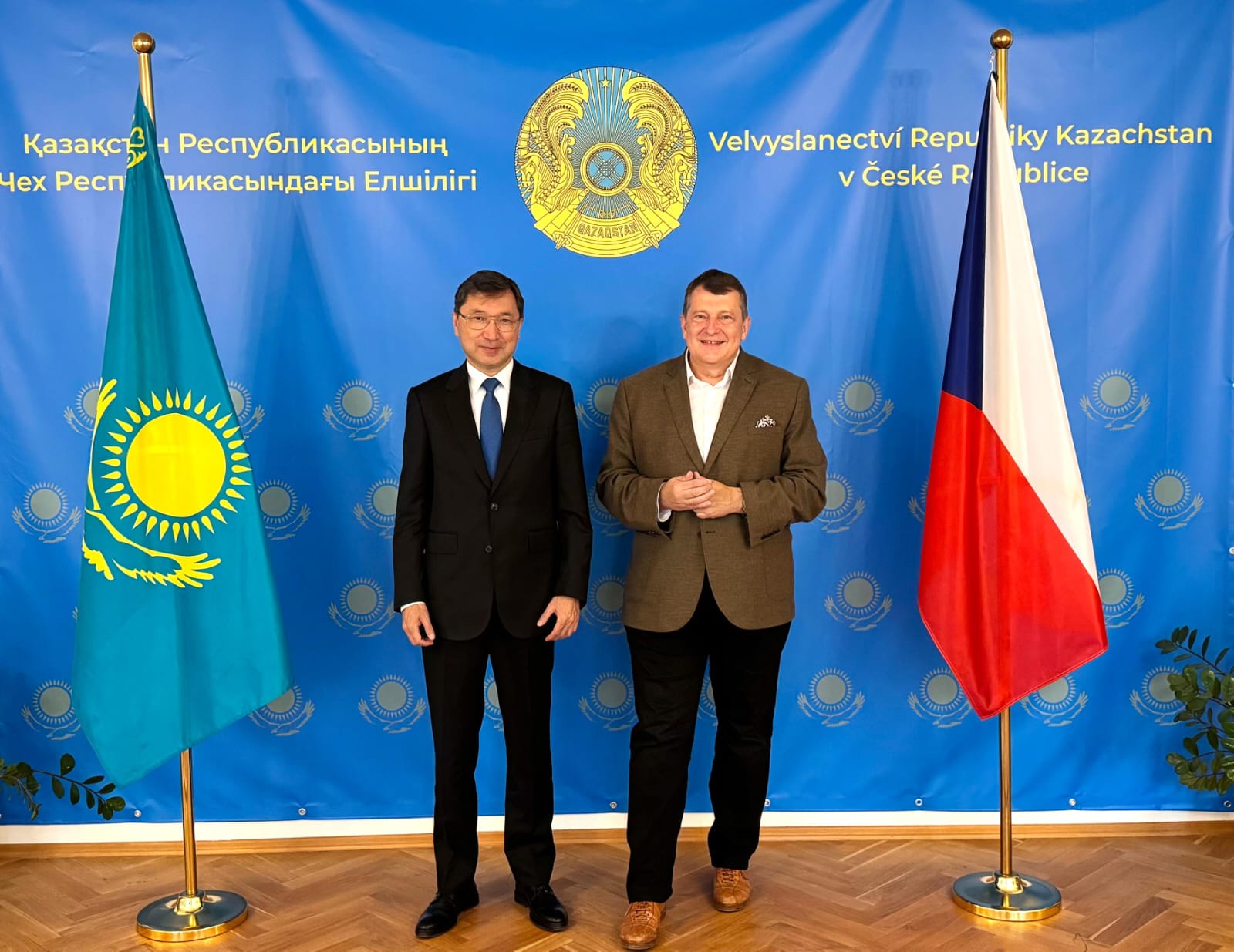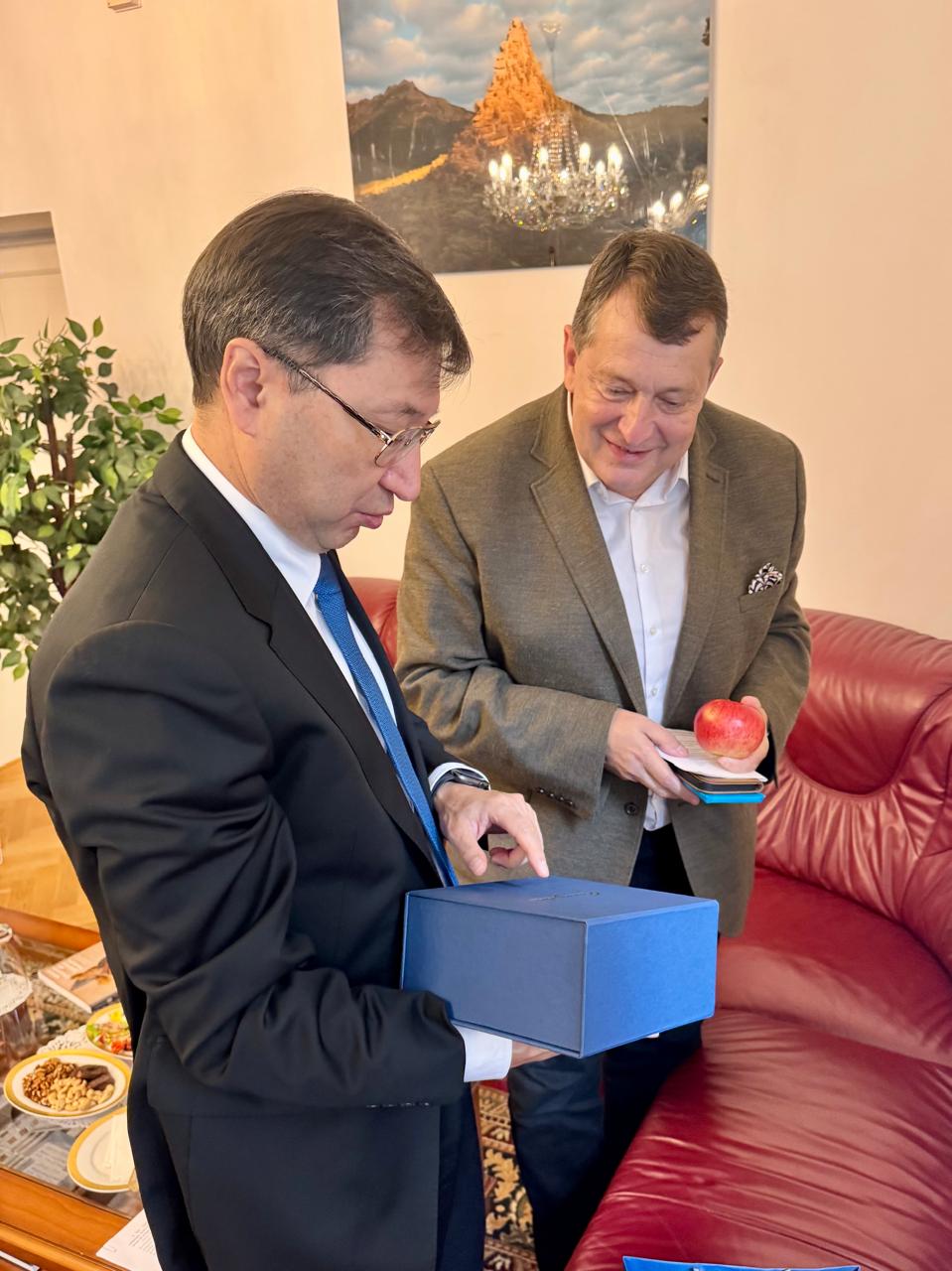- Hans Weber
- December 22, 2025
Interview with H.E. Mr. Bakyt Dyussenbayev the Ambassador of the Republic of Kazakhstan to the Czech Republic
On Friday, October 17th, I had the opportunity to speak in detail with H.E. Mr. Bakyt Dyussenbayev, the Ambassador of the Republic of Kazakhstan to the Czech Republic, about bilateral relations and the country.
- Mr. Ambassador, how would you describe the current bilateral relations between Kazakhstan and the Czech Republic, and what are the key areas of economic cooperation?
Over the past three decades, Kazakhstan and the Czech Republic have built a strong and trust-based partnership. We view the Czech Republic as a reliable and time-tested partner within the European Union. Our relations are marked by regular high-level contacts, constructive political dialogue, and active cooperation between governments and parliaments.
Beyond politics, our partnership has expanded into trade, investment, education, culture, and innovation. According to Czech data, in 2024 the trade turnover between Kazakhstan and the Czech Republic reached about 1.3 billion US dollars – and both sides agree that the trend is clearly upward. Kazakhstan mainly exports mineral fuels, chemicals, raw materials, and agricultural products, while importing machinery, transport equipment, pharmaceuticals, and advanced technologies.
Looking ahead, we see great potential in mechanical engineering, transport, energy, agriculture, and pharmaceuticals. New areas of cooperation are emerging in hydrogen, nuclear energy, nanotechnology, and modern mining equipment. Kazakhstan also remains one of the main suppliers of crude oil to the Czech Republic, contributing to Europe’s energy security. At the same time, both our countries share the goal of moving toward cleaner and more sustainable energy solutions.
- Kazakhstan is often described as a “bridge between Europe and Asia.” What strategic role does your country play today, particularly in cooperation with the European Union and regional partners?
Kazakhstan’s geography naturally makes it a bridge between Europe and Asia – not only in transport terms but also politically and culturally. As President Kassym-Jomart Tokayev noted at the UN General Assembly, our country is developing as a key logistics hub for transit between Asia and Europe. By 2029, we plan to build 5,000 kilometers of new railway lines, strengthening both regional and global connectivity.
This vision extends beyond our borders. Central Asia is now experiencing a new sense of unity and mutual trust, turning into an active contributor to global stability and development. The “Central Asian Five” format shows how regional solidarity can drive progress, while “Central Asia Plus” dialogues connect us with the EU, China, the United States, and other global partners.
Cooperation with the European Union remains one of Kazakhstan’s top foreign-policy priorities. We were the first country in Central Asia to sign and implement the Enhanced Partnership and Cooperation Agreement (EPCA), covering 29 areas from trade and investment to environmental protection and innovation. Together with the EU, we are advancing projects under the Global Gatewaystrategy, aimed at green transition, energy security, and sustainable growth.
At the same time, Kazakhstan maintains a balanced approach to all major partners. Our strategic partnership with China is steadily developing – bilateral trade exceeded 30 billion US dollars in 2024 – and Kazakhstan plays a key role in the Belt and Road Initiative, connecting Asia and Europe through modern transport routes.
Ultimately, our strategic mission is clear: to promote dialogue over division, and connectivity over confrontation. Through balanced diplomacy, Kazakhstan seeks to serve as a reliable and constructive bridge between East and West.
- This year Kazakhstan marks 35 years since the Declaration of State Sovereignty. How do you assess the country’s development since independence and the ongoing reforms under President Tokayev?
The Declaration of State Sovereignty, adopted on 25 October 1990, laid the foundation for modern Kazakhstan. It affirmed the nation’s political, economic, and cultural autonomy, symbolizing determination, unity, and confidence in its future.
Since gaining full independence in 1991, Kazakhstan has made remarkable progress. The country has become one of the most stable and dynamically developing states in the region – strengthening institutions, diversifying the economy, and fostering an active civil society.
Under President Kassym-Jomart Tokayev, comprehensive reforms are underway to build a “Just and Fair Kazakhstan.” They aim to strengthen the rule of law, ensure transparency, and create a more accountable, citizen-oriented state. Powers have been rebalanced among branches of government, and a transition from a bicameral to a unicameral parliament will be decided by referendum in 2027 after broad public discussion.
Economically, reforms focus on diversification, entrepreneurship, and green growth, turning Kazakhstan into a reliable and innovation-driven investment destination. The new national brand – Born Bold – reflects this transformation and the country’s confident, forward-looking spirit.
Today, Kazakhstan is recognized as a middle power – an active and responsible member of the international community that promotes peace, dialogue, and sustainable development through balanced and constructive diplomacy.
- Kazakhstan is a country with vast natural resources but is increasingly committed to renewable energy and climate protection. What are your government’s priorities in this area?
Kazakhstan fully recognizes its responsibility in addressing global climate challenges and follows a balanced, pragmatic approach to green transition. In 2023, the country adopted the Strategy for Achieving Carbon Neutrality by 2060, which outlines technological and economic steps toward sustainable growth.
Our energy system is still based on four key pillars – oil and gas, coal, uranium, and critical minerals – which remain vital for stability and energy security. At the same time, Kazakhstan is investing heavily in modern technologies that make traditional energy cleaner and more efficient.
We are also expanding solar, wind, and hydropower capacities, developing green finance mechanisms, and introducing a national carbon-trading system. The idea is not to make an abrupt shift, but to modernize through technology – ensuring energy reliability while steadily reducing emissions.
Kazakhstan’s approach reflects its broader vision: to remain a responsible and forward-looking energy partner that combines traditional strengths with innovation and sustainability.
- The Semipalatinsk Test Site was one of the largest nuclear testing grounds of the former Soviet Union. How does Kazakhstan deal with this legacy today, both politically and environmentally?
The Semipalatinsk nuclear test site is a tragic legacy that Kazakhstan has transformed into a symbol of peace and global responsibility. Between 1949 and 1989, more than 450 nuclear explosions took place there. On 29 August 1991, Kazakhstan made the historic decision to close the site permanently – an act that laid the foundation for our peace-oriented foreign policy. The United Nations later declared this date the International Day against Nuclear Tests.
After independence, Kazakhstan inherited the world’s fourth-largest nuclear arsenal. Yet we voluntarily renounced it and joined key international treaties on non-proliferation and disarmament, establishing ourselves as a responsible and trusted global partner.
Much has also been done to address the environmental and social consequences. Kazakhstan continues to rehabilitate affected territories, conduct radiation monitoring, and support local communities. In cooperation with the IAEA and other international partners, we promote the peaceful use of nuclear energy and strengthen global safety standards.
Today, the former test site stands not as a reminder of tragedy, but as a lasting symbol of resilience, moral strength, and Kazakhstan’s unwavering commitment to peace and human security.
- Many Czechs know Kazakhstan mainly from the news but not from personal experience. What would you highlight to encourage more visitors?
Kazakhstan is a country of breathtaking landscapes, ancient traditions, and warm hospitality. From the modern capital Astana to the cultural heart Almaty, from the Tien Shan and Altai Mountains to the Great Steppe and the Charyn Canyon – every region offers something unique.
Our national parks and nature reserves cover about nine percent of the country – roughly the size of Great Britain. Among the most remarkable sites are the Petroglyphs of Tamgaly, the Bozzhyra Gorge in the Mangystau region, Kaindy Lake, Burabay, and the Altyn-Emel National Park.
Direct flights between Astana and Prague, operated by SCAT Airlines, now run twice a week – making travel easier than ever. Kazakhstan welcomes Czech travelers to experience its natural beauty, diversity, and sincere hospitality. As I often say, once you visit Kazakhstan, you will always want to return.
- Education and science are increasingly important in Kazakh–Czech cooperation. What are the main directions of academic partnership?
Education has become one of the strongest bridges between Kazakhstan and the Czech Republic. Today, more than 3,000 Kazakh students study at Czech universities in Prague, Brno, Ostrava, and other cities through exchange programs and state scholarships.
Academic cooperation continues to expand. Over 60 memoranda of understanding have been signed between Kazakh and Czech universities, creating a solid basis for joint research and innovation. The Czech Technical University in Prague cooperates with several Kazakh institutions, including the Almaty University of Power Engineering and Telecommunications and the Saken Seifullin Kazakh Agrotechnical Research University.
A successful example is the Kazakh–Czech International Research Center for Aquaculture, established in Astana in cooperation with the University of South Bohemia in České Budějovice. It focuses on sustainable agriculture and environmental sciences.
Discussions are also underway to open Czech university branches in western Kazakhstan – a new step toward closer academic collaboration in green technologies, IT, and agriculture.
- Kazakhstan hosts the world-famous Baikonur Cosmodrome. How important is Baikonur for Kazakhstan today, and how does your country cooperate with Russia and other international partners in the field of space exploration?
We take great pride that the world’s largest spaceport is located on Kazakh soil. From Baikonur, humanity made its first journey into space – a legacy that inspires us to look forward.
Since 1994, the city and the cosmodrome have been leased by Russia, serving as a key platform for international cooperation in space research. At the same time, Kazakhstan continues to develop its own national space programs and technologies aimed at expanding research and innovation potential.
Our goal is to transform it into a hub for scientific exchange, education, and tourism, while deepening cooperation with the European Space Agency and other global partners. In this way, Baikonur remains both a historic symbol of progress and a strategic platform for the future.
- The Kazakh community in the Czech Republic is gradually growing. What role does the diaspora play in strengthening mutual understanding?
The Kazakh community in the Czech Republic is steadily expanding and has become an active, vibrant part of local society. More than 10,000 of our compatriots – students, professionals, and families – contribute to strengthening cultural ties and promoting mutual understanding between our nations.
The Embassy works closely with the diaspora and student associations, supporting cultural and social initiatives, charity events, and festivals where Kazakhstan is represented through its national crafts, music, and cuisine.
Through these activities, the Kazakh community serves as a living bridge between Kazakhstan and the Czech Republic – preserving traditions, fostering friendship, and encouraging new forms of cooperation.
- Kazakhstan has a rich religious and cultural history. How would you describe the role of Islam in contemporary Kazakh society?
Kazakhstan is a secular state that guarantees freedom of religion and equality of all citizens before the law. At the same time, religion plays an important role in the spiritual and cultural life of the nation, where different faiths coexist peacefully and enrich one another.
Home to over 100 ethnic groups and more than 4,000 religious organizations, Kazakhstan has developed a unique model of interethnic and interfaith dialogue based on the principle of “unity in diversity.” The Assembly of the People of Kazakhstan helps maintain harmony and mutual respect among communities.
Astana also regularly hosts the Congress of Leaders of World and Traditional Religions, bringing together spiritual leaders from across the globe as a platform for dialogue and understanding.
Islam, as the predominant religion in Kazakhstan, plays a significant role in shaping the country’s moral and cultural values. Alongside other traditional faiths such as Orthodox Christianity, it contributes to an atmosphere of mutual respect, social harmony, and tolerance. Together, these religions strengthen the moral foundations of society and support Kazakhstan’s long-standing stability and unity.
- Finally, a personal question: What do you personally appreciate about the Czech Republic, and what are your hopes for the future of bilateral relations?
I have great respect for the Czech Republic – for its history, culture, and the warmth of its people. Living and working here, I admire how the country combines deep traditions with modern dynamism and a strong sense of community.
I also see many similarities between our peoples: a shared appreciation for independence, education, and cultural heritage, as well as a practical mindset and genuine hospitality that make us natural partners.
Looking ahead, I am confident that Kazakhstan and the Czech Republic will continue to strengthen their partnership – expanding cooperation in the economy, education, culture, and sustainable development. We share many common values and aspirations, and I truly believe that our best years of collaboration are still ahead.
Recent posts
See AllPrague Forum Membership
Join us
Be part of building bridges and channels to engage all the international key voices and decision makers living in the Czech Republic.
Become a member


